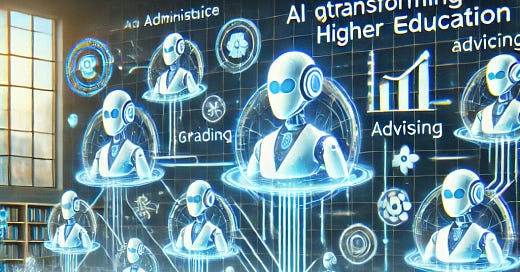AI Agents: The Next Evolution in Computer Interaction and Their Impact on Higher Education
The future of generative AI is in AI agents that can perform almost any computer task, though it will take a few years. (I wrote about this back in April.) Two recent announcements make me think that AI agents may be widespread sooner than I thought. I’ll provide some more in-depth insights in the future, but I wanted to make sure you were paying attention to AI agents and what they might mean for higher ed.
AI agents are like digital robots that perform tasks for you, such as arranging trips, scheduling appointments, responding to emails, ordering groceries … just about anything you do digitally. I envision vast networks of these agents working together to perform complex tasks on behalf of users. This idea isn’t new; one of my first conference papers was about intelligent agents (in the 1990s!). We’ve had AI agents for some time; think of Alexa, Siri, or Google Assistant. These have their place, but they’re pretty limited in what they can do. The pieces necessary to vastly expand the capabilities are falling into place.
In the last week or so, two major AI companies, Anthropic (makers of Claude) and Google (creators of Gemini), announced services allowing AI apps to control computers by doing things like inputting text and opening apps. These functions are available now, although you need to be able to code to use them since they’re only available through Anthropic’s application programming interface (API).
There are also reports that Google is working on AI that takes over the user’s browser, automating web tasks like ordering products, planning trips, and making reservations. Amazon is reportedly working on something similar. Microsoft is rumored to be testing agents that can control Windows machines. Expect more AI agent services before long.
If you’re in higher ed, watch AI agent development. AI will change how we work. Take student advising: it’s part admin, part mentoring. Admin tasks don’t need faculty expertise. For example, after students meet with me, I have to go into our system and release them to register. There are also lots of other little necessary, but tedious tasks that need to be done, such as sending emails, checking curricula, searching for courses, etc. It would be awesome if a network of AI agents could do all of the administrative tasks, freeing me up for mentoring. You could come up with lots of examples from your own work.
Imagine a student services AI agent network that can monitor student progress through a learning management system, then automatically direct struggling students to services such as AI tutoring systems and human counselors while also creating personalized learning materials that are tailored to that particular student and the challenges they face.
Getting these agents to work correctly is a massive undertaking. There’s a lot of design and testing that needs to be done before we should rely on AI agents, especially when we have a bunch of them working together. I want these agents to be pretty foolproof before I’ll let them use my credit card! Privacy, security, and ethical challenges also abound. These need to be carefully considered before AI agent networks are put into production. But, we’ll get there, it will just take some time.
In some respects, AI agents are where generative AI will live up to its promise of freeing us from the drudgery of tedious tasks, allowing us to spend our time on more rewarding aspects of our work. We’re a long way from achieving this promise, but we’re getting closer, and that’s a good thing.
In future articles, I’ll explore specific scenarios for how agent networks could transform everything from course design to annual evaluations. We live in interesting times.




